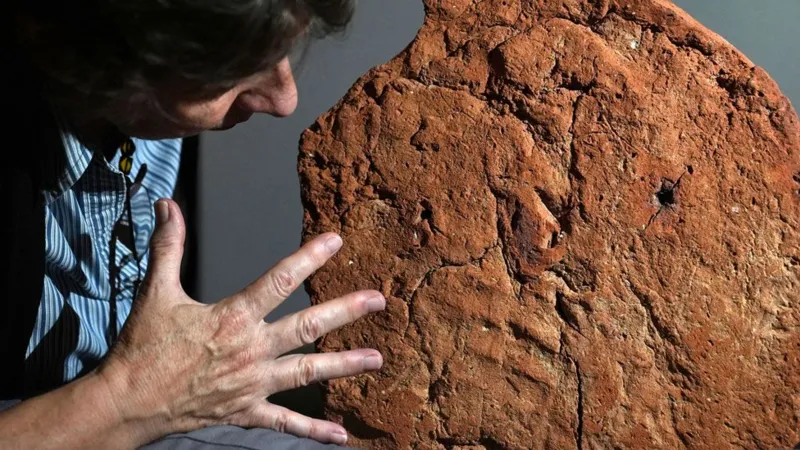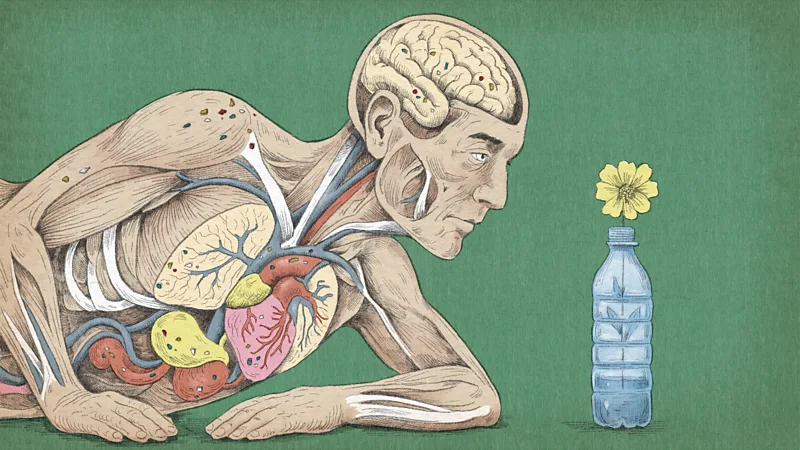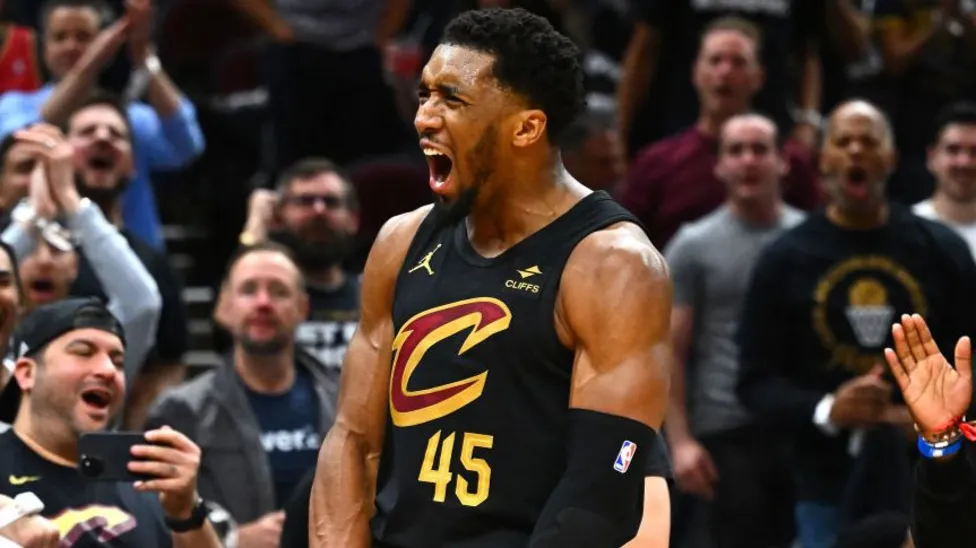Trump wins latest: Putin 'open' to call before inauguration; how did Barron help Trump win 'bro-vote'?
Donald Trump's team say he will start appointing top jobs in days as he prepares to re-enter the White House - and the Kremlin has not ruled out a call with Vladimir Putin before then. President Joe Biden will address the American people for the first time since Trump's historic win today.

'Anti-press extremist' Trump must change - as media rights group records dozens of threats
Press freedom organisations have warned Donald Trump to change his attitude towards journalists - with one tallying dozens of threats during the campaign trail alone.
The Freedom of the Press Foundation described the president-elect as "an anti-press extremist obsessed with punishing journalists and news outlets who criticise him".
"Trump has spent the last year on the campaign trail calling for more leak investigations, imprisoning journalists, and censoring news outlets he doesn't like," the group said in a statement.
"Lawmakers and President Biden must act before it's too late," it added, calling on Congress to pass a bill preventing Trump from "spying on journalists" as he "repeatedly did in his first term".
Reporters Without Borders (RSF) claimed Trump insulted, attacked or threatened the media at least 108 times over an eight-week period in the run-up to the election - a figure that does not include posts on social media.
Trump sued CBS just a week ago after an interview of his rival Kamala Harris aired on its 60 Minutes news program in early October, alleging the broadcaster manipulated answers to flatter her.
He said CBS should lose its licence and warned "we're going to subpoena their records" - and that Comcast, the parent company of NBC News, MSNBC and Sky News, will be investigated for "treason" if he is elected.
"Rather than doubling down on the hostility he has espoused towards the media so far, Trump should take the opportunity instead to repair the domestic press freedom climate and reposition the United States as a global leader in press freedom," RSF said.
The group added Trump said the term "fake news" - which he uses against media critical of him - publicly as many as 2,000 times during his first term in office, which roughly amounts to once every 18 hours.
Europe's leaders are meeting now and Trump will dominate their agenda
As the world prepares to adapt to ties with a Donald Trump-led America, Europe's leaders are meeting to discuss security and "transatlantic relations" today.
The European Political Community - which was formed in the wake of Russia's invasion of Ukraine - holds these summits every six months, but Trump's victory is certain to dominate conversations today.
Trump has been critical of US aid to Ukraine and has repeatedly claimed he would end the war there quickly - raising fears he will try to force Kyiv to cede territory for a peace plan.
Tonight, EU leaders have been invited to an "informal meeting" to discuss "transatlantic relations" - and Trump will without doubt come up.
In a sign of the already changed atmosphere, the German defence minister, who met his French counterpart yesterday, said after Trump's victory: "They'll be able to do less in Europe. We need to fill this gap to be more credible in terms of deterrence."
The council's president, Charles Michel, said the EU wants to be a respected partner and deepen its ties with the US, although it acknowledges views may diverge on certain topics.
"I trust the American society," he added, as he and others urged Trump to continue to support Ukraine.
"They know it is in their interest to show firmness when we engage with authoritarian regimes. If the United States were weak with Russia, what would it mean for China?"
Ukrainian President Volodymyr Zelenskyy is attending, as is Sir Keir Starmer, with the summit hosted by Hungarian Prime Minister Viktor Orban, who had said he would be opening "several bottles of champagne" if Trump wins.
Musk: Being a 'normal person' helped win Trump the election
Elon Musk says Donald Trump won the presidential election because he went on Joe Rogan's podcast and was "a normal person".
Trump spoke for three hours on The Joe Rogan Experience, which aired in the penultimate week of his election campaign and has been viewed by more than 46 million people on YouTube.
Musk said the interview "really [made] a difference" for Trump with the electorate, who were able to see the president-elect in a different light.
"They just listen to someone talk for a few hours and that's how they decide whether you're, you know, a good person, whether they like you," he told Tucker Carlson in a live broadcast yesterday.
By comparison, Musk said if Kamala Harris had appeared on Rogan's podcast, it "would have been game over".
"Nothing would do more damage to Kamala's campaign than going on Joe Rogan because she'd run out of nonsequiturs after about 45 minutes," he said.
"Hour two and three would be a complete melted puddle of nonsense, so it would just be absolute game over.
"But on the [other] hand Trump is… he's there and there's no talking points, he's just being a normal person, he's having a conversation."
Lammy comments won't affect Trump-UK relations, says former ambassador
The former UK ambassador to the US says Donald Trump won't care too much about negative comments made about him by British politicians.
New Tory leader Kemi Badenoch urged Sir Keir Starmer to apologise to Trump for "derogatory" remarks made about him by Foreign Secretary David Lammy.
Lammy called the president-elect a "woman-hating, neo-Nazi-sympathising sociopath" in a magazine article in 2018.
Kim Darroch quit his role as ambassador to the US in 2019 after it emerged he had described Trump's government as "dysfunctional", "inept" and "divided" in private letters.
But he's told Sky News the new president will likely rather focus on having positive relations with the Labour government instead of being engaged in squabbles.
"I think [Trump] will know about comments made by some British politicians," says Darroch.
"But the other thing about Trump is that he respects power, and he knows that the likelihood is that for all of his second term as president, Keir Starmer will be British prime minister, and this will be the British government that he deals with."
Darroch adds: "So I think he has an interest in having a good relationship with Starmer personally, and with his government in general.
"I wouldn't worry too much about what's been said in the past. Boris Johnson said some very, very critical things about Trump when he was mayor of London, but it didn't stop him having a good relationship with Trump when he was prime minister."
Darroch says he thinks Starmer has "made a good start" with Trump by calling him after his assassination attempt, having dinner with him on his last trip to the US and calling him yesterday.
"He's doing all the things that you should do."
How second Trump presidency could realign US diplomacy towards authoritarian leaders
Donald Trump's second term could lead to a shake-up of US diplomacy which moves it more toward populist, authoritarian leaders, political observers have said.
Nearly half of US voters told an AP VoteCast survey they were "very concerned" that another Trump presidency would bring the country closer to authoritarianism.
Hungary - Prime Minister Viktor Orban
Viktor Orban is Trump's biggest cheerleader in Europe.
Regarded with suspicion by the rest of the EU because of his ties to Vladimir Putin, the Hungarian leader celebrated Trump's victory and the pair have already spoken over the phone.
Orban has been accused by the EU of burying Hungary's democracy by dominating media and building a network of loyal oligarchs.
His government has also come under fire for its record on political freedom, women's equality and LGBT rights.
Russia - President Vladimir Putin
Trump has avoided publicly criticising Putin and has sometimes spoken warmly about him, in contrast to most Western leaders.
He once called the Russian president "genius" and "savvy" for his campaign against Ukraine - though he later publicly condemned the invasion.
Trump has also claimed he would end the war in Ukraine "within 24 hours" if re-elected - a vow welcomed by the Kremlin, which currently holds an advantage on the battlefield and about a fifth of Ukrainian territory.
Nigel Gould-Davies, of the International Institute of Strategic Studies, said "there is clearly that sort of authoritarian-minded chemistry," between the two leaders.
He said Putin and other authoritarian leaders will be pleased about Trump's re-election, which will mean "much less emphasis in American foreign policy on the importance and value of human rights".
India - Prime Minister Narendra Modi
Narendra Modi sent the "heartiest of congratulations" to his "friend" Donald Trump after it was announced he would return to the White House.
Modi is a popular but polarising leader whose politics have divided India, especially along religious lines.
He has presided over a fast-growing economy while advancing Hindu nationalism in his country.
Modi has been accused of using hate speech against the country's minority Muslim community, especially in the last phase of election campaigning this year.
His supporters think he has improved India's standing in the world, but his critics say he has eroded the country's democracy.
Turkey - President Recep Tayyip Erdogan
Recep Tayyip Erdogan hailed Trump's win as a "new era" for America after a "great battle" by the president-elect.
Like Trump, Erdogan projects an image of strength that prioritises national interests and relies on messages that present him as a leader for the people.
The US has been intent on keeping Turkey at arms-length due to its stance on a range of issues, most recently its support for Hamas in the Gaza war.
However, Trump and Erdogan have cultivated a cordial relationship despite a series of differences between their countries.
ICYMI: Pandemic and price hikes created 'headwinds', Obamas say
In case you missed it, Barack and Michelle Obama issued a statement last night following Donald Trump's election victory.
The pair said that although they have "profound disagreements with the Republican ticket", they wanted to congratulate Trump and his running mate JD Vance.
"Living in a democracy is about recognising that our point of view won't always win out, and being willing to accept the peaceful transfer of power," they said.
They said the pandemic and price hikes are conditions that have "created headwinds for democratic incumbents around the world, and last night showed that America is not immune".
"The good news is that these problems are solvable - but only if we listen to each other, and only if we abide by the core constitutional principles and democratic norms that made this country great.
"In a country as big and diverse as ours, we won't always see eye to eye on everything. But progress requires us to extend good faith and grace - even to people with whom we deeply disagree."
How did Barron Trump help his father win the 'bro-vote'... and just how tall is he?
As Donald Trump walked on stage in Florida yesterday to announce himself as America's 47th president, the internet was all thinking one thing...
How tall is Barron Trump?
The 18-year-old was literally towering over his dad, who was busy hailing his "incredible victory" over Kamala Harris in the presidential election.
"Barron Trump may very well be just three normal height humans stacked on top of one another," one person wrote on X.
"Where the hell did Barron Trump get them damn height genes," asked another.
Barron is the only child of president-elect Trump and his wife, Melania, and, according to some online sources, he stands at 6ft 9in.
Others have put him at a more moderate 6ft 7in, though even this height still makes him much taller than his 6ft 2in father.
He also dwarves all of his siblings, despite being the youngest of the five Trump offspring.
Compare images of Barron from his first public appearances alongside his father as a 10-year-old in 2016 to now - and the difference is startling.
Trump has previously revealed the secret behind his son's height, saying it was the cooking of Melania's mother, Amalija Knavs, that caused him to be so tall.
"Boy, did she take care of Barron," he said. "That's how he got so tall - he only ate her food."
"I said, 'You're going to be a basketball player'," he recalled of one conversation with Barron. "He said, 'Well, I like soccer Dad, actually'.
"I thought... at your height, I like basketball better, but you can't talk them into everything."
Before he potentially enters the world of sport, Barron has been credited with playing a big role in helping his dad appeal to younger voters.
According to Jason Miller, a senior adviser to Trump, Barron has been the architect of his dad's podcast strategy.
Trump sat down with influential, popular podcasters Joe Rogan, Theo Von and Logan Paul during the campaign to try to win over the so-called "bro-vote".
"Barron has been very involved in selecting or recommending, I should say, a number of the podcasts that we should do," Miller said.
"I got to tell you, hats off to the young man. Every single recommendation he's had has turned out to be absolute ratings gold that's broken the internet. He's done a great job."
Earlier this year, Barron declined the chance to serve as a delegate on behalf of his father at the Republican National Convention, according to his mother's office.
As a delegate, Barron would have had to stand on the convention floor and join the Florida delegation in formally nominating his father.
It's unclear if Barron will play an official role in the second Trump presidency.
During his first term, Trump handed several jobs out to family members, including giving senior advisory roles to his daughter Ivanka and son-in-law Jared Kushner.
NATO chief says Trump will push Europe to do more on global threats
NATO chief Mark Rutte has said he is looking forward to meeting Donald Trump and navigating how to combat global threats from countries such as North Korea, Iran, China and Russia.
Speaking to our political correspondent Tamara Cohen before a summit of European leaders in Budapest, the secretary-general said Trump will push Europe to "spend more on defence" and "do more in the future" as he has previously.
"He was right. He got his way. We went to the 2% [GDP defence spending target] thanks to his doing, for a large part," Rutte said.
He warned that North Korea, Iran, China and Russia are "working together" and are a threat not only to European countries in NATO but also to the US.
Rutte told another reporter that he looked forward to sitting down with Trump and navigating "how collectively he will make sure that we face this threat and that we keep our part of the world safe".
Trade wars and Taiwan - what Trump's next four years could look like in China
China's President Xi Jinping has congratulated Donald Trump on his election triumph and said the two countries would "benefit from cooperation and lose from confrontation".
But behind closed doors, Chinese officials may be holding onto their seats. Expect a wild ride ahead in China-US relations.
The first punch from Trump is likely to come in the form of tariffs. He’s mooted 60% tariffs on Chinese products and removing it from its favoured trading nation status.
This could be bluster or it could be exactly what Trump has in mind for China. No one knows for sure.
Regardless, China will need an economic plan in place about how to respond.
The 60% tariffs could knock 2.5% off China's GDP growth, cutting it in half. This would be a body blow to the country's economy at a time when it’s dealing with the real estate sector slump, weak consumer spending and youth unemployment.
China does have levers to pull. It could introduce tariffs on US agricultural exports and export controls on critical minerals.
By coincidence, Chinese officials are meeting in Beijing this week to thrash out their latest financial package to revive the economy. If they factor Trump and tariffs into the future, China's government may decide a bigger stimulus plan is called for.
The other key question is Taiwan.
China wants to "reunify" with this self-governed democratic island. The island wants to maintain the status-quo.
What does president-elect Trump want? Judging from his comments, he wants Taiwan to pay for its defence. It's a familiar complaint South Korea and Japan may get used to hearing as well.
Countries in Asia will also be watching to see how a Trump presidency deals with the Russia-Ukraine War.
If Russia is allowed to keep Ukrainian territory, there is a fear in the region that it would embolden President Xi to either blockade Taiwan to force it to submit to unification or attempt a short-sharp war to take the island.
There is a sense in Asia that the rule book is out, personal relationships are back and trade wars could be coming.
-SKY NEWS







